#jadaliyya
Text
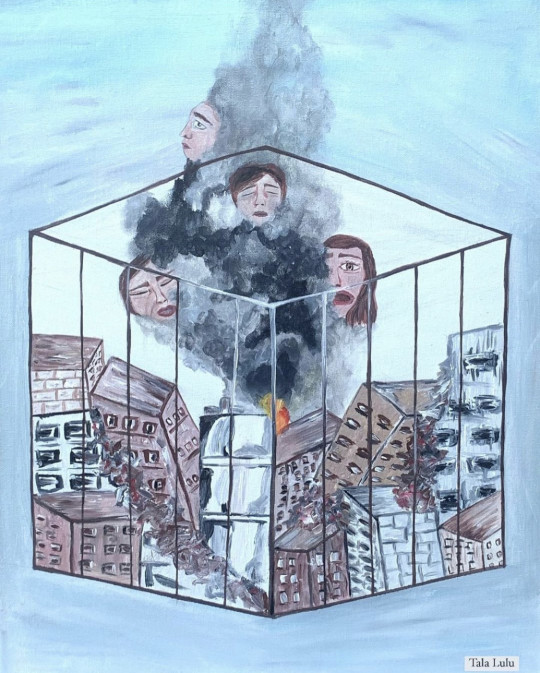
Ashjan Ajour (أشجان عجّور), An Account from the Genocide in Gaza: ‘What My Family is Going Through is Impossible', «Genocide In Gaza», Institute for Palestine Studies, November 23, 2023. Plus: A View from Gaza: My Family Under the Trauma of War in Gaza, «Jadaliyya», August 25, 2021
(image: Painting by Ashjan Ajour's daughter, Tala Lulu (تالا لولو))

(image: Tala Lulu (تالا لولو))
When children are murdered, words become meaningless… their souls will be looking down upon us
I started working on this piece on the 17th of May 2021. As of that moment, the Israeli settler occupation killed 198 people in Gaza – 58 of them children.
I finished 3 days later. But they were still killing.
[…]
– Tala Lulu (تالا لولو)
#art#illustration#magazine#ashjan ajour#tala lulu#institute for palestine studies#jadaliyya#arab studies institute#2020s
43 notes
·
View notes
Text

Analysis from Mouin Rabbani
#free gaza#free palestine#gaza strip#irish solidarity with palestine#palestine#gaza#news on gaza#al jazeera#boycott israel#israel#Mouin Rabbani#Analysis#Jadaliyya#ICJ
28 notes
·
View notes
Text
the war on palestine podcast at jadaliyya
jadaliyya has launched the war on palestine podcast, an approximately 20-minute regular program hosted by noura erakat, ziad abu-rish, and bassam haddad.
the podcast will include updates on what is happening on the ground in gaza and the rest of palestine, with the united nations and legal advocacy, regional state's policies, the u.s. media landscape, and grassroots mobilizations.
you can listen to the first episode from october 29, which introduced the landscape of israeli occupation of palestine and the recent ramp-up in genocidal violence, on youtube (audio-only) and/or soundcloud.
youtube
3 notes
·
View notes
Text
Gaza in Context: A Collaborative Teach-In Series: First Installment: Gaza 101
20 October 2023
1:00-2:30 PM EST / 10:00-11:30 AM PST
LIVE ON: YOUTUBE.COM/JADALIYYA
Featuring: Ziad Abu-Rish, Fida Adely, Aslı Bali, Rana Barakat, Rochelle Davis, Beshara Doumani, Noura Erakat, Adel Iskandar, Maya Mikdashi, Sherene Seikaly, Lisa Wedeen
Moderated by: Bassam Haddad
“We are together experiencing a catastrophic unfolding of history as Gaza awaits a massive invasion of potentially genocidal proportions. This follows an incessant bombardment of a population increasingly bereft of the necessities of living in response to the Hamas attack in Israel on October 7.
The context within which this takes place includes a well-coordinated campaign of misinformation and the unearthing of a multitude of essentialist and reductionist discursive tropes that depict Palestinians as the culprits, despite a context of structural subjugation and Apartheid existence.
The co-organizers below are convening weekly teach-ins and conversations on a host of issues that introduce our common university communities, educators, researchers, and students to the history and present of Gaza, in context.
In this first teach-in session, we feature short introductions to the topic and foreshadow the conversations to come. We will also be screening clips from the documentary GAZA IN CONTEXT, which provides an analytical and data-driven background on Gaza.”
(text from event website)
3 notes
·
View notes
Text
By : Sherene Seikaly
Jadaliyya May 15, 2023 Palestine
"In the age of catastrophe, Palestine is a paradigm. It can teach us about our present condition of the permanent temporary: we are all unclear about what the future holds."
#jadaliyya#Sherene Seikaly#palestine#paradigms#ongoing nakba#life under siege#shared and global#the permanent temporary
0 notes
Text
sliman mansour - also referred to as suleiman mansour - is a palestinian painter, sculptor and cartoonist. he was born one year before the nakba in 1947 in birzeit, which is north of ramallah. he now resides in jerusalem. mansour is one of the most famous palestinian artists of all time, and palestinian american artist samia halaby considers him to be part of the liberation art movement¹. his art focuses on the concept of samud², or "a firm rootedness in the land." he is a founder of the league of palestinian artists³.


🍉🍉🍉🍉🍉🍉🍉🍉🍉🍉🍉🍉🍉🍉🍉🍉🍉🍉
on using only palestinian materials during the first intifada⁴:
That was the philosophy of the intifada. When you read their literature and leaflets, it's about boycotting Israeli goods and trying to rely on ourselves. Most people were trying to do that, by planting their land or starting a small farm to live from. As an artist I thought, why don't we do the same? Why don't we search for natural materials to do our work from?
The mud came from my childhood memories. As a child I used to work with my grandmother when she was building beehives and even ovens with mud. And I was always around her, trying to help. So when I thought about material that I could use, mud was the first thing that came to my mind. After a while, once I started making figures, I realized that the mud also reflects the human fate with the cracks, people waiting to disappear, fall down and go away.
go take a look at his art. reblog with your favorite pieces of his.
mine is the village awakens (1988)
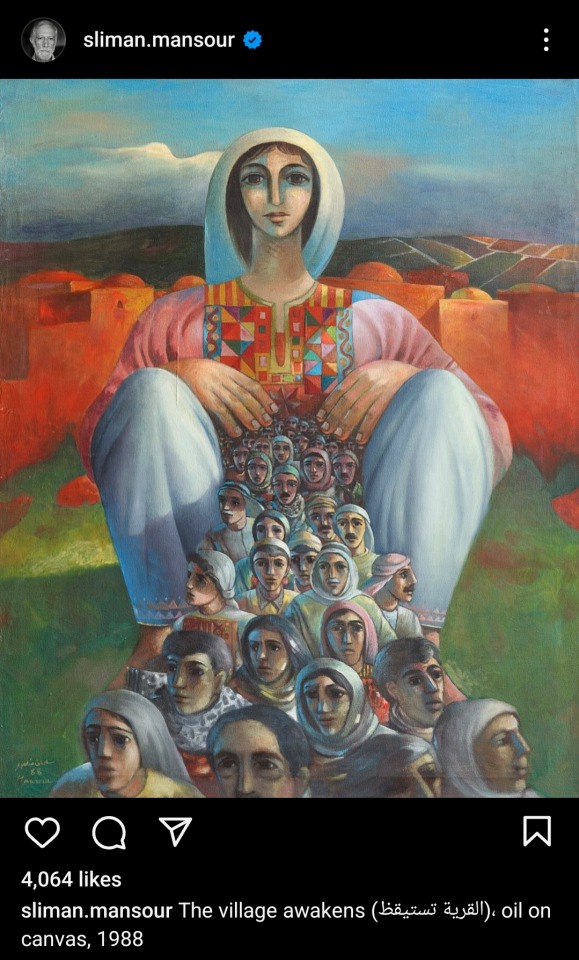
sources:
jadaliyya interview with samia halaby
palestinian art by gannit ankori pg. 74
dafbeirut
dw interview with sliman mansour
his website | insta
#palestinian art#sliman mansour#palestine#jerusalem#art#free palestine#west bank#artists#tumblr deleted all my linked sources 🔪🔪🔪🔪🔪 hopefully i got them all back in#spoiler alert: it didnt i had to do some a third time lmaooo#literally i never cite sources like that i always just link directly but tumblr is a fumblr
804 notes
·
View notes
Text

Free Khalida Jarrar! The feminist, leftist, and Palestinian scholar was seized from her home in El-Bireh, occupied Palestine, in the morning hours of 26 December 2023 as part of mass arrests by Zionist forces in the West Bank of occupied Palestine during the genocide in Gaza.
Jarrar is a historical leftist leader with the PFLP and is currently a scholar and researcher at the Muwatin Institute at Birzeit University. In fact, she was scheduled to appear on 27 December at a panel convened by Jadaliyya on imprisonment in the time of genocide.
She is a lifelong advocate for the liberation of political prisoners and was targeted specifically for her statements and advocacy for the liberation of Palestinian prisoners.Jarrar has been imprisoned on multiple occasions by the occupation regime, including in 2015, when her administrative detention without charge or trial drew global protests before she was then transferred to the occupation military courts.
In 2019, she was once again seized by the occupation regime. While she was imprisoned, her daughter Suha tragically passed away. She was denied the right to see Suha's body and attend her funeral before she was released again in 2021.
During both of her times of imprisonment, she established independent educational programs to teach the imprisoned minor girls the high school education they were denied as well as the adult women prisoners their rights under international law.
She discusses her imprisonment in the book by RamzyBaroud and Ilan Pappe, "Our vision for liberation;" her piece is published at the PalestineChronicle:
Samidoun network
@ SamidounPP
394 notes
·
View notes
Text
In 1901, Liang Qichao, a prominent Chinese journalist, wrote an essay entitled “The New Rules for Destroying Countries” (“Mieguo xinfan lun”).
In it, he presented what he had come to understand were the patterns of nineteenth-century Euro-American colonial-imperialist world domination into which China was being drawn. Egypt is the first among five examples he cited of a people and a state crushed by these “new rules.” No simple military invasion or despoiling occupation, the new rules proceeded under a subtler logic. According to Liang, English financial advisers had inserted themselves into the Egyptian court, inducing the state to indebt itself so completely that international bankers could take over from within. This ingenious mode of domination constituted what Liang called “formless dismembering,” hardly detectable as it proceeds, and announcing itself suddenly once it has taken place. Without quite articulating it, Liang was theorizing the advent of finance capitalism in relation to colonialism, with Egypt at its core. [...]
---
Aaron Jakes [...] takes up the relation between imperialist domination through the financialization of capitalism in the colonies [...] in his comprehensive account of the British occupation of Egypt from 1882 to 1914. [...] The [financial] crises, produced in the metropole [London, Paris, New York, etc.], were analytically and practically worked out by yoking colonies as productive places and colonials as laboring and culturally marked/racially othered bodies to metropolitan concerns over empire [...], making Egypt a “laboratory in which to settle those greater questions of the Empire” (25). [...] [T]he original goal of British colonial governance was to enhance [...] cotton-growing for export to the global market and capital investment/speculation. [...] The British restructuring of rural space and agrarian social relations [...] severely constrained the room for maneuver of the Egyptian peasantry, who had long used the porousness of the relations among land, property, labor, and power to gain whatever advantages they could. Peasants were now locked firmly in place, and when [...] [financial] crisis hit, their indebtedness left them relatively defenseless. By 1905, superficial prosperity hid roiling discontent with economic development but also with colonial legitimacy. [...]
---
[T]he Egyptian journalist Ahmad Hilmi recognized the British discourse of development as “gilded speech” that created an economistic reality without accounting for the lived complexity of actual Egyptians. As Jakes puts it: “despite the occupation’s command over the means of representation, the shared sentiments and experiences of the Egyptian people were irreducible to the charts and tables that adorned the pages of Cromer’s annual reports” (118).
In comparing Egypt’s poverty to the British-produced poverty of Ireland, for example, the economic boom of gushing capital investment was revealed to be a mechanism of wealth accumulation for the few. [...] [T]he gap between rhetoric and reality [...].
---
All text above by: Rebecca E. Karl. “Review of Egypt’s Occupation: Colonial Economism and the Crises of Capitalism.” Jadaliyya online. 21 June 2022. [Bold emphasis and some paragraph breaks/contractions added by me.]
421 notes
·
View notes
Text
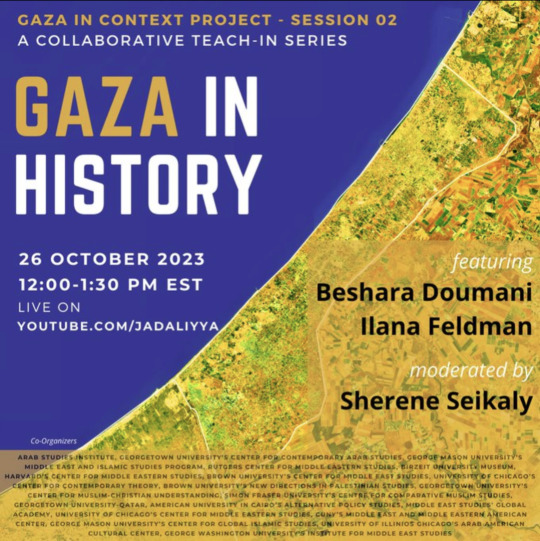
For anyone looking to educate themselves, the second teach-in, this time on Gaza's history, will be on the Jadaliyya youtube channel at noon on Thursday the 26th. (If you can't join live, they'll have the video record up later.)
Beshara Doumani is the currently serving president of Birzeit University and author of Rediscovering Palestine. Ilana Feldman is the author of Governing Gaza and Life Lived in Relief: Humanitarian Predicaments and Palestinian Refugee Politics.
127 notes
·
View notes
Text
Two Palestinians were killed by Israeli settlers in occupied West Bank on Monday
youtube
The UN has called on Israeli forces to end their support for attacks by Israeli settlers in the Occupied West Bank and US State department spokesperson Matthew Miller also expressed concern. He said Israeli officials have a responsibility to stop settler violence against Palestinians.
Mouin Rabbani, a non-resident fellow at the Center of Conflict and Humanitarian Studies and a co-editor of Jadaliyya, an online magazine, joins Al Jazeera’s live from Montreal.
7 notes
·
View notes
Text

14 notes
·
View notes
Text
queer short cuts week 31: free palestine

queer short cuts is a biweekly newsletter where i share queer & trans short film recommendations; each set of films is themed and comes out to no more than one hour cumulatively. content notes are included at the end of each post. you can also check out the full spreadsheet of films i've recommended.
this week, i am recommending short films created by or about queer palestinians. and i wish it were a given that i could write this week’s newsletter without first having to explain why it’s necessary to support palestinian liberation. but i’m seeing some of the worst misinformation and suppression of pro-palestinian speech, and the worst dehumanization of palestinian people, that i have seen in my entire life. if you feel unequivocal of your support for palestine, then you can skip down to the second section in the link where i talk about films, but if you are on the fence in any way, please do read the whole intro.
check out the film recs
and along with watching this week’s films, please do what you can to fight for palestinian freedom:
donate, if you have the means, to organizations working on the ground in occupied palestine, like baitulmaal, medical aid for palestine, palestine children’s relief fund, and doctors without borders
contact your local leaders to demand support for palestine – people in the u.s. can send emails and/or make calls to your legislators, and people in the u.s., u.k., and canada can use these templates created by palestinian organizers to write to politicians, universities, news outlets, businesses, and more
learn more about the fight for palestinian liberation through decolonize palestine, the palestine resource library, coverage at jadaliyya, and free e-books offered by haymarket books, and about jewish support for palestinians and opposition to zionism at jewish currents and jewish voices for peace
uplift palestinian voices and combat misinformation you’re seeing and hearing on social media or in your communities
202 notes
·
View notes
Text
Princeton is offering a class for the upcoming fall semester that includes a book by Rutgers University's gender and women's studies Professor Jasbir Puar that accuses Israel's military of purposefully maiming Palestinians.
The class, "The Healing Humanities: Decolonizing Trauma Studies from the Global South," is being taught by Assistant Professor of Near Eastern studies Satyel Larson, and included on the reading list is Puar's book "The Right To Maim," according to the catalog. The book argues that the Jewish state has supplemented the "right to kill" with the "right to maim" in order to create a "mass debilitation of Palestinian bodies," according to a summary.
"Puar's analysis culminates in an interrogation of Israel's policies toward Palestine, in which she outlines how Israel brings Palestinians into biopolitical being by designating them available for injury," the summary reads. "Supplementing its right to kill with what Puar calls the right to maim, the Israeli state relies on liberal frameworks of disability to obscure and enable the mass debilitation of Palestinian bodies. Tracing disability's interaction with debility and capacity, Puar offers a brilliant rethinking of Foucauldian biopolitics while showing how disability functions at the intersection of imperialism and racialized capital."
The class description explains that students will learn the "transdisciplinary field of trauma" and the efforts to decolonize around the globe, according to the class catalog. The course seeks to show how trauma is used in conjunction with "global legacies of violence, war, racism, slavery, patriarchy, colonialism, orientalism, homophobia, ableism, capitalism, and extractivism."
In 2016, Puar spoke at Vassar College in New York and accused Israel of ethnically cleansing Palestinians from the West Bank and the Gaza Strip. She said that during her time studying "generational effects of maiming and stunting of children in Gaza," many Palestinians believed that the bodies of their children killed in the conflict were "mined for organs for scientific research," according to an article Puar wrote for Jadaliyya, a media outlet produced by the Arab Studies Institute.
Princeton did not immediately respond to the Daily Caller News Foundation's request for comment.
12 notes
·
View notes
Text
Israel is an occupying power, and under international law, has NO right to defend itself.
#palestine#genocide#israel is committing genocide#united nations#international law#israel#war crimes
8 notes
·
View notes
Text
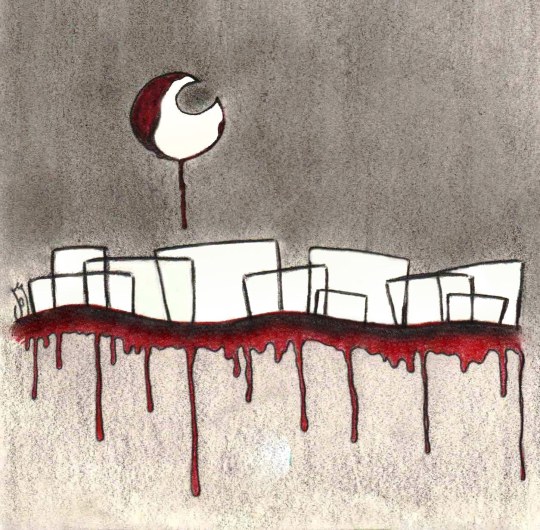
لا يتبخر الدم بل يغوص في الأرض
طلال سلمان --
Blood does not evaporate. It sinks into the earth.
--Talal Salman
[art by Amal Kaawash, originally published in Jadaliyya in 2012 to commemorate 30 years since Sabra and Shatila]
2 notes
·
View notes
Text
samia halaby is a palestinian american artist, activist, educator and scholar. she was born in al quds/jerusalem in 1936 during the british mandate, and her family was displaced from yafa/jaffa in the nakba in 1948¹. she is a famed abstract artist² and leftist/marxist palestinian liberation activist who has recently been silenced by her alma mater indiana university³. she has documented palestinian art in her scholarly work, including in liberation art of palestine⁴.

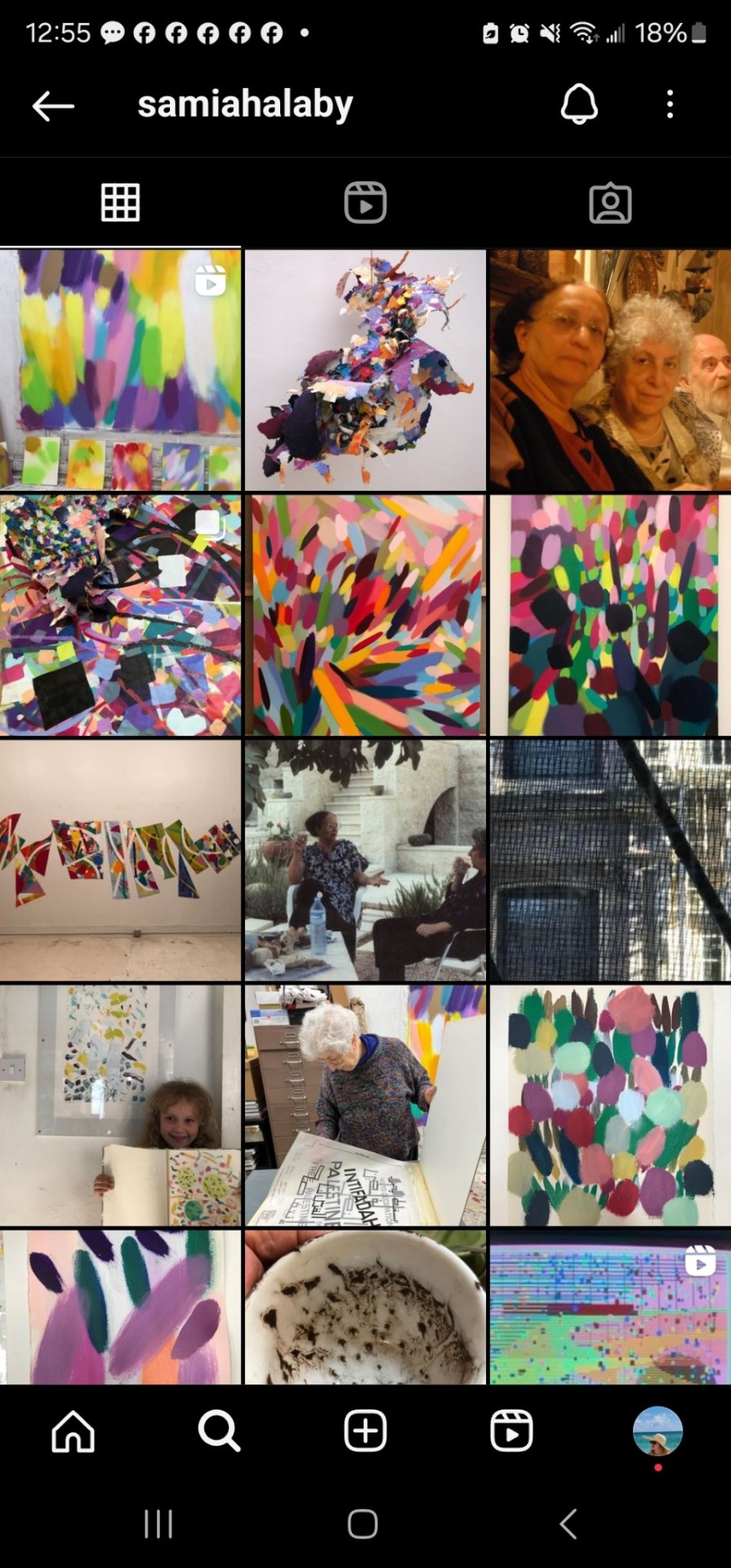
🍉🍉🍉🍉🍉🍉🍉🍉🍉🍉🍉🍉🍉🍉🍉🍉🍉🍉
in her own words, how art is a "symptom" of society⁵:
You know, I can make a banner and a poster. Does that change what Rockefeller is going to decide to do with this money next year? No. Does that stop him from giving $4 billion to Israel? No matter how hard I try, or how often I walk the streets and demonstrate. But art is a flowering of society. It’s not the other way around.
The Impressionists are really amazing. Take note that they are popular and beloved by everybody. Which is not artificial – people really admire them, not because they’re sweet and fruity, but because they recognize in them the first step away from praising the ruling class, to praising the middle class and even the worker. By the time you get to some of the French Cubists, like [Fernand] Léger and the early Constructivists, you see clear praise of the worker and a growing focus on the general and on abstraction. To me, abstraction is an efflorescence of working class revolution.
reblog with your favorite of samia's works is!
my favorite is twin sine waves, made in 1972.
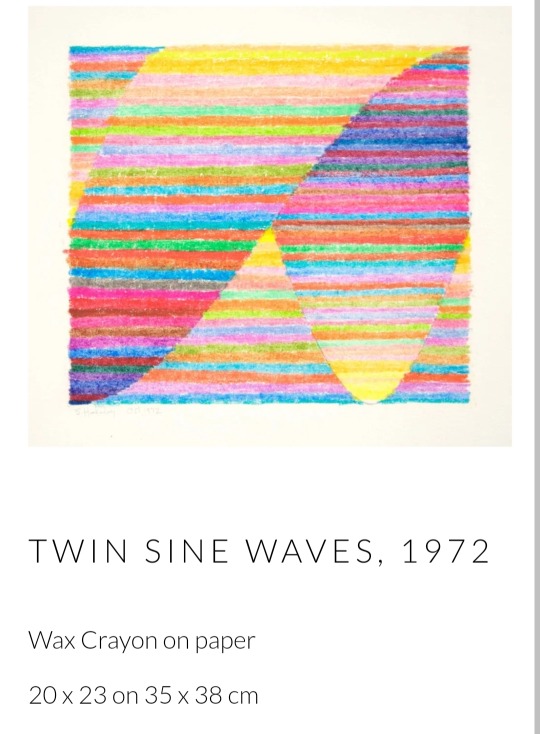
sources:
samia halaby's official website
palestine museum page on samia
democracy now! interview with samia
jadaliyya interview with samia
mondoweiss interview with samia
ayyam gallery
#free palestine#palestine#palestinian artist#palestinian art#palestinian artists#samia halaby#artists#art#jerusalem
61 notes
·
View notes